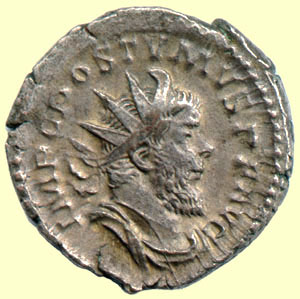 Contents -
Previous Article -
Next Article
Contents -
Previous Article -
Next Article
The Third Century was a time of drastic changes for the Roman Empire. In Europe, the ancient world with its large, centrally governed empires was in the process of being changed into the medieval world of small and separate kingdoms. The Goths and other Germanic tribes were being pushed ever westward by the Huns, who in turn were being forced out of their homeland by Asian steppe people who were also putting pressure on Imperial China. The great migrations of people during this period helped to eventually bring about the total collapse of the Western Roman Empire two hundred years later. This collapse was delayed, but not prevented, by some exceptional leaders who emerged near the close of the Third Century. (See Diocletian and Constantine I).
The Roman emperor Gallienus had left his son Saloninus in Cologne to take care of events on the Rhine frontier in A. D. 258 because he had numerous other rebellions with which to contend. Soon, Saloninus quarreled with a high ranking officer named Marcus Cassianius Postumus who was probably the imperial legate or the commander of the Rhine legions. Saloninus was killed and Gallienus set up a separate empire in Gaul. Gallienus also extended his authority into Spain and Britain using a combination of diplomacy and the threat of military force.
Gallienus was an excellent commander and a conscientious emperor. The German tribes on the Danube took advantage of the trouble Gallienus was having with Persia and the numerous rebellions with which he had to deal and stepped up the intensity of their forays into Roman territory. On looking back, it could be said that the rebellion of Postumus was actually good for the Western Roman Empire because Postumus was a highly capable leader during this time of crisis.
In A. D. 268, an obscure governor of Lower Germany named Laelianus rebelled. Postumus quickly crushed the rebels, but would not let his own troops sack Mainz, the city where the rebels had made their headquarters. The mutinous troops killed Gallienus and set up their own emperor Marius. Marius did not last for more than a few days when he was in turn murdered by the troops.
Go to next article on Emperor Laelianus
Go back to previous article on Emperor Quietus